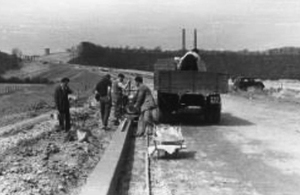England’s first motorway turns 60 with major technology upgrade
Exactly 60 years ago today (5 December 1958), 2,300 drivers drove along a new road for the first time…and straight into the history books.

The eight-mile section of road they were driving on was the Preston bypass – the very first motorway in Britain, which is now part of the M6. It had just two lanes in each direction, no safety barrier in the central reservation and no electronic signs or other technology.
Today hundreds of thousands of drivers travel more than 20 million miles on the M6 every day, accounting for one in eight of all motorway journeys.
They are now on the cusp of a major technology transformation which will significantly improve journeys on the M6. In the latest stage of the motorway’s evolution, Highways England is now pledging to complete four upgrades on the M6 by spring 2022 to add extra lanes and better technology to 60 miles of the motorway between Coventry and Wigan.
One driver, Chris Lee, 68 from Warrington, a Vice President of the Lancashire Automobile Club who remembers being driven on the Preston bypass as an 8-year-old boy by his older brother shortly after it opened, welcomed the new move.
It’s been interesting to see how motorways have changed over the years and I think smart motorways are the only real answer to dealing with the amount of traffic we now have on motorways. It makes much more sense to be driving at a consistent speed instead of constantly accelerating and braking.
The first upgrade between Crewe and Knutsford in Cheshire is due to be finished by spring next year, and contractors are currently completing the installation of 258 electronic signs, 104 traffic sensors and 70 CCTV cameras along the 20-mile route.
The four upgrades, worth around £900 million, also involve converting the hard shoulder to a permanent extra lane to increase capacity by a third.
Andrew Jinks, smart motorway director at Highways England, said:
The M6 provided a major economic boost to the country when it first opened 60 years ago and it still provides a vital link between London and Scotland through the West Midlands and North West.
Hundreds of thousands of drivers now use the motorway every day to get to work, meet friends and family, or for long distance deliveries, and the smart motorway upgrades will ensure the M6 is fit for the future.
Our motorways have changed massively over the past six decades and smart motorways could be just a glimpse of the technology transformation still to come. In 60 years’ time, driverless vehicles could be as commonplace as a car radio.
The amount of traffic using England’s motorways has increased by almost two thirds in the past 25 years alone, including more than double the number of vans as next day deliveries become a part of everyday life.
England’s motorways now cover nearly 1,800 miles and the Preston bypass is almost unrecognisable following a major upgrade to a four lane motorway in the 1990s which replaced all the original bridges.
Looking back at the motorway’s history, Lancashire Automobile Club’s Chris Lee said:
We lived in Penwortham at the time and I remember the excitement of driving on the motorway for the first time. There was no speed limit then and my brother managed a top speed of 100mph downhill towards Samlesbury in my father’s Riley 1.5 – a hair raising experience to say the least!
People forget just how bad traffic was in the 50s and 60s before motorways. Cars would be beeping their horns outside my home on Leyland Road at one o’clock in the morning in traffic jams during bank holidays, or on their way back from Blackpool Illuminations.
It was a real game changer when the Preston bypass opened but it took a while for people to get used to it. I remember seeing one family stopping to have a picnic on the hard shoulder.
The new smart motorway technology will allow variable speed limits to be automatically set on overhead signs to improve the flow of traffic, preventing stop-start conditions and tailbacks caused by sudden braking.
The technology will also be used to detect queuing traffic, breakdowns and collisions as they happen so that Highways England’s traffic officers and the emergency services can respond quickly to incidents.
Find out more about how to drive on a smart motorway.
General enquiries
Members of the public should contact the Highways England customer contact centre on 0300 123 5000.
Media enquiries
Journalists should contact the Highways England press office on 0844 693 1448 and use the menu to speak to the most appropriate press officer.